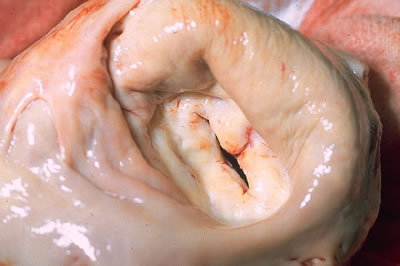Mitral Valve Stenosis
Mitral valve stenosis is the narrowing of the
opening of the heart's mitral valve. Here, thickened valve halves
(cusps or leaflets) do not open and close properly and causes
interference with blood flow.

Thickened mitral halve leaflets of the left atrium.
Symptoms of Mitral Valve Stenosis
The symptoms of mitral heart stenosis are:
- Shortness of breath (dyspnea), especially
when lying down
- Difficulty breathing, to the point of waking up with inability
to breathe
- Fatigue or weakness
- Rapid heart beat or palpitations
- Blood in cough or spit (hemoptysis)
In many cases, the symptoms of this disease is very mild and
may not be noticeable.
Possible Complications
Many people with this condition never develop any noticeable
symptoms or health problems.
However, the narrowing of the valve opening causes increased
pressure in the atrial chamber, which causes fluid to backup into
the lungs and results in pulmonary congestion
and edema.
If the thickening of the mitral valve halves also prevents the
valve from fully closing, blood can flow "backward"
into the left atrium of the heart (called mitral valve
regurgitation), which cause the left ventricle to pump
harder and harder. This can ultimately lead to enlarged and weakened
ventricle.
Because of this improper "backward" flow of blood,
blood flow int he atrial chamber can become stagnant or turbulent.
This can cause small clots to form. If these clots are dislodged,
they can cause the following complications:
- Pulmonary edema, if these clots lodge in the lungs' arteries
- Stroke, if they travel to the brain
- Pain in the hands and feet, due to emboli or arterial obstruction
if the clots travel there.
If left untreated, long-term mitral valve stenosis can also cause
high lung pressure or pulmonary hypertension.
Mitral Valve Stenosis Treatment
People who have been diagnosed with heart valve abnormalities
should inform their doctors, surgeons, and dentists before any
medical or dental procedures. Usually, a precautionary dose of
antibiotics is necessary to reduce the risk of developing heart
infections, such endocarditis.
Patients with heart palpitations or atrial fibrillation may be
treated with:
- Digoxin or other antiarrhytmic medications to help regulate
the heart's rhytm
- Blood-thinning medications, such as warfarin or coumadin
In cases of severe valve defect, the following surgical procedures
may be performed:
- Balloon valvuloplasty
In this procedure, a flexible catheter is inserted into the
constricted area and a balloon on its tip is inflated, which
forces the valve to open.
- Commissurotomy
Here, the valve halves are surgically widened
- Valve transplant
For severely damaged valves, transplantation with an artificial
or mechanical valve or valve from pig's heart may be necessary.
Prognosis
When treated early, the prognosis for mitral valve stenosis is
good. Similarly, the prognosis for valve surgeries and even transplant
are good.


